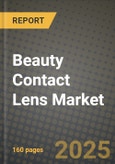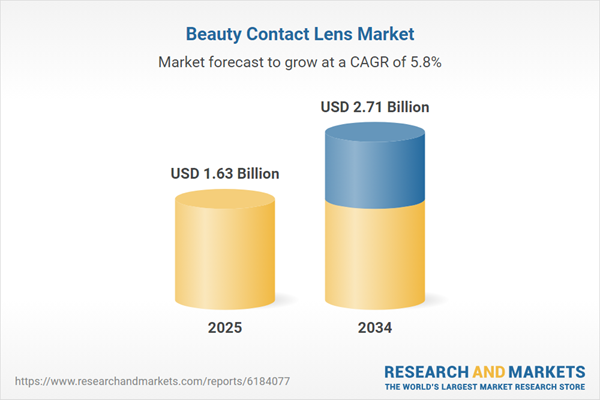Beauty Contact Lens Market
The beauty contact lens market comprises plano (non-corrective) and prescription color lenses designed to enhance or transform iris appearance - ranging from subtle tints and limbal-ring “circle” designs to opaque, pattern, and cosplay styles. Products span daily disposables, bi-weekly/monthly replacements, and specialty toric/multifocal color options for astigmatism and presbyopia. Material innovation centers on high-water hydrogels and silicone hydrogels with pigment “sandwich” processes that encapsulate dyes away from the ocular surface; surface treatments improve wettability and deposit resistance. Digital try-on, creator marketing, and K-beauty aesthetics amplify social discovery, while professional channels stress fit, oxygen transmissibility, and safe wear time.Demand drivers include fashion and self-expression, event and wedding seasons, social media cycles, and the desire for correction + cosmetics in one device. Growth is tempered by clinical safety requirements (fit, hygiene, wear schedule), counterfeit/gray-market risks, and variable regulations around medical device classification and retail licensing. Brands differentiate through comfort (edge design, modulus, lubricity), natural-look print fidelity, wide power ranges, and dermatologist/ophthalmologist endorsements. Go-to-market models blend eye-care professional fittings, optical retail, and fast-growing D2C and social commerce; private-label and ODM manufacturing are common. Ecosystem complements include peroxide-based care systems for reusable lenses, preservative-light rewetting drops, and bundled subscription programs. Sustainability considerations are rising - lighter blister packs, recycling initiatives, and water-efficient tinting processes. As regulators tighten oversight and consumers become more eye-health aware, winning portfolios balance fashion-forward designs with clinical credibility, frictionless e-commerce, and education that elevates safe wear and replacement compliance.
Beauty Contact Lens Market Key Insights
- Daily disposables set the safety/comfort bar. Single-use color lenses reduce care-related complications and appeal to occasional wearers for events; premium lines add higher Dk/t silicones and moisture-retention chemistries to sustain all-day comfort.
- Natural aesthetics require print science. Multi-layer, dot-matrix, and gradient techniques mimic stroma and limbal textures; accurate diameter and limbal ring control prevent an artificial “stamp” effect while preserving pupil alignment and visual clarity.
- Correction + cosmetics converge. Expanding power ranges (spherical, toric, multifocal) let wearers avoid stacking clear lenses under tints. Inventory planning and forecast accuracy are critical as SKUs multiply across color, power, and base curve.
- Professional channel remains trust anchor. Chair-time fittings, topography where needed, and after-care reinforce safe adoption and repeat purchase - especially for first-time wearers and astigmatism corrections.
- D2C and social commerce accelerate trials. AR try-on, creator reviews, and micro-drops drive discovery and limited-edition urgency; compliance nudges (replacement reminders, wear-time tips) reduce risk in self-serve journeys.
- Counterfeit and gray-market risk. Unregulated lenses raise infection and compliance concerns; traceable packaging, serialized labels, and authorized-seller programs become procurement and brand-protection essentials.
- Material & surface advances. Silicone hydrogels with pigment encapsulation, plasma or hydrophilic coatings, and low-modulus edges improve comfort and wettability without compromising color opacity or print durability.
- Inclusive shade philosophy. Shade libraries tuned for diverse iris and skin tones, plus “enhancement” vs. “opaque” variants, expand addressable market while reducing returns due to unexpected appearance outcomes.
- Regulatory and clinical evidence decide scale. Clear labeling, professional-only SKUs in stricter markets, post-market vigilance, and published comfort/safety data build credibility with regulators and clinicians.
- Sustainability enters the brief. Recyclable blister/foil, reduced rinse water in tinting, and mail-back programs resonate with premium buyers and retailer scorecards - without compromising sterility or shelf life.
Beauty Contact Lens Market Reginal Analysis
North America
Growth pulls from daily-disposable color expansions, influencer-led launches, and wedding/event spikes. Regulation treats lenses as medical devices, keeping the professional channel influential; leading brands combine e-commerce convenience with RX verification and authorized-seller controls. Differentiation centers on toric ranges, comfort tech, and rapid fulfillment, with strong anti-counterfeit measures and education on hygiene and replacement cycles.Europe
Stringent medical-device frameworks favor CE-marked portfolios, professional fitting, and multilingual patient instructions. Natural-look aesthetics dominate over theatrical styles in everyday wear. Retailers and optical chains prioritize evidence of oxygen performance, pigment encapsulation, and data-backed comfort. Sustainability credentials and recycling pilots influence tenders with large chains and department stores.Asia-Pacific
The demand epicenter - anchored by K-beauty, J-fashion, and cosplay - spans daily and monthly modalities with strong D2C and convenience-store/optical retail blends. Shade libraries and limbal rings skew toward “enlarging” effects; counterfeit control and safety education remain priorities. Local manufacturers drive ODM/private label; fast content cycles and AR try-on capabilities are critical to conversion.Middle East & Africa
High fashion adoption in urban hubs favors premium daily disposables and professional-dispensed monthly lenses. Hot, arid climates elevate dryness management and lubricant compatibility. Distributors win with Arabic-language education, strict sourcing, and clinic partnerships; event and wedding segments support seasonal promotions and bundle offers.South & Central America
Influencer culture and festival seasons boost trial; affordability shapes modality mix, with monthly lenses strong and dailies growing. Compliance prompts, retailer training, and clear hygiene guidance mitigate risk in emerging e-commerce. Authorized distributor networks, Spanish/Portuguese support, and broad power ranges drive repeat purchase across optical chains and marketplaces.Beauty Contact Lens Market Segmentation
By Design
- Spherical Contact Lenses
- Toric Soft Contact Lenses
- Multifocal Contact Lenses
- Cosmetic Contact Lenses
By Technology
- Bifocal Contacts for Astigmatism
- Contacts for Dry Eyes
- Colored Lenses
- Special-Effect Lenses
- Prosthetic Lenses
- Custom Lenses
- UV-Inhibiting Lenses
- Scleral Lenses
By Material
- Soft Lenses
- Silicone Hydrogel Lenses
- Gas Permeable Lenses
- Hybrid Contact Lenses
- Pmma Lenses
Key Market players
Johnson & Johnson Vision (Acuvue Define), Alcon (Dailies Colors), Bausch + Lomb (Lacelle), CooperVision (Expressions/Color), Hoya, Menicon, GEO Medical, NEO Vision, Dreamcon, Bescon, MaxVUE Vision (ColorVue), FreshKon, Hydron, Pegavision, MiacareBeauty Contact Lens Market Analytics
The report employs rigorous tools, including Porter’s Five Forces, value chain mapping, and scenario-based modelling, to assess supply-demand dynamics. Cross-sector influences from parent, derived, and substitute markets are evaluated to identify risks and opportunities. Trade and pricing analytics provide an up-to-date view of international flows, including leading exporters, importers, and regional price trends.Macroeconomic indicators, policy frameworks such as carbon pricing and energy security strategies, and evolving consumer behaviour are considered in forecasting scenarios. Recent deal flows, partnerships, and technology innovations are incorporated to assess their impact on future market performance.
Beauty Contact Lens Market Competitive Intelligence
The competitive landscape is mapped through proprietary frameworks, profiling leading companies with details on business models, product portfolios, financial performance, and strategic initiatives. Key developments such as mergers & acquisitions, technology collaborations, investment inflows, and regional expansions are analyzed for their competitive impact. The report also identifies emerging players and innovative startups contributing to market disruption.Regional insights highlight the most promising investment destinations, regulatory landscapes, and evolving partnerships across energy and industrial corridors.
Countries Covered
- North America - Beauty Contact Lens market data and outlook to 2034
- United States
- Canada
- Mexico
- Europe - Beauty Contact Lens market data and outlook to 2034
- Germany
- United Kingdom
- France
- Italy
- Spain
- BeNeLux
- Russia
- Sweden
- Asia-Pacific - Beauty Contact Lens market data and outlook to 2034
- China
- Japan
- India
- South Korea
- Australia
- Indonesia
- Malaysia
- Vietnam
- Middle East and Africa - Beauty Contact Lens market data and outlook to 2034
- Saudi Arabia
- South Africa
- Iran
- UAE
- Egypt
- South and Central America - Beauty Contact Lens market data and outlook to 2034
- Brazil
- Argentina
- Chile
- Peru
Research Methodology
This study combines primary inputs from industry experts across the Beauty Contact Lens value chain with secondary data from associations, government publications, trade databases, and company disclosures. Proprietary modeling techniques, including data triangulation, statistical correlation, and scenario planning, are applied to deliver reliable market sizing and forecasting.Key Questions Addressed
- What is the current and forecast market size of the Beauty Contact Lens industry at global, regional, and country levels?
- Which types, applications, and technologies present the highest growth potential?
- How are supply chains adapting to geopolitical and economic shocks?
- What role do policy frameworks, trade flows, and sustainability targets play in shaping demand?
- Who are the leading players, and how are their strategies evolving in the face of global uncertainty?
- Which regional “hotspots” and customer segments will outpace the market, and what go-to-market and partnership models best support entry and expansion?
- Where are the most investable opportunities - across technology roadmaps, sustainability-linked innovation, and M&A - and what is the best segment to invest over the next 3-5 years?
Your Key Takeaways from the Beauty Contact Lens Market Report
- Global Beauty Contact Lens market size and growth projections (CAGR), 2024-2034
- Impact of Russia-Ukraine, Israel-Palestine, and Hamas conflicts on Beauty Contact Lens trade, costs, and supply chains
- Beauty Contact Lens market size, share, and outlook across 5 regions and 27 countries, 2023-2034
- Beauty Contact Lens market size, CAGR, and market share of key products, applications, and end-user verticals, 2023-2034
- Short- and long-term Beauty Contact Lens market trends, drivers, restraints, and opportunities
- Porter’s Five Forces analysis, technological developments, and Beauty Contact Lens supply chain analysis
- Beauty Contact Lens trade analysis, Beauty Contact Lens market price analysis, and Beauty Contact Lens supply/demand dynamics
- Profiles of 5 leading companies - overview, key strategies, financials, and products
- Latest Beauty Contact Lens market news and developments
Additional Support
With the purchase of this report, you will receive:- An updated PDF report and an MS Excel data workbook containing all market tables and figures for easy analysis.
- 7-day post-sale analyst support for clarifications and in-scope supplementary data, ensuring the deliverable aligns precisely with your requirements.
- Complimentary report update to incorporate the latest available data and the impact of recent market developments.
This product will be delivered within 1-3 business days.
Table of Contents
Companies Mentioned
- Johnson & Johnson Vision (Acuvue Define)
- Alcon (Dailies Colors)
- Bausch + Lomb (Lacelle)
- CooperVision (Expressions/Color)
- Hoya
- Menicon
- GEO Medical
- NEO Vision
- Dreamcon
- Bescon
- MaxVUE Vision (ColorVue)
- FreshKon
- Hydron
- Pegavision
- Miacare
Table Information
| Report Attribute | Details |
|---|---|
| No. of Pages | 160 |
| Published | November 2025 |
| Forecast Period | 2025 - 2034 |
| Estimated Market Value ( USD | $ 1.63 Billion |
| Forecasted Market Value ( USD | $ 2.71 Billion |
| Compound Annual Growth Rate | 5.8% |
| Regions Covered | Global |
| No. of Companies Mentioned | 15 |









